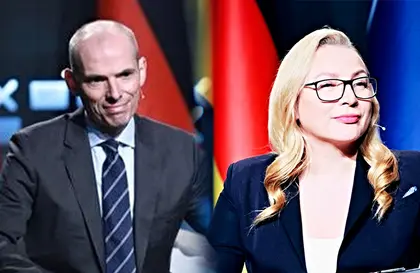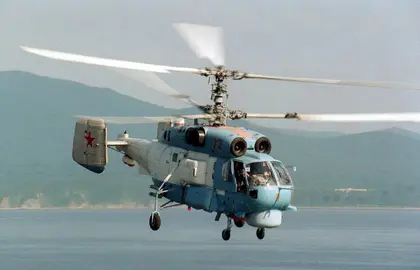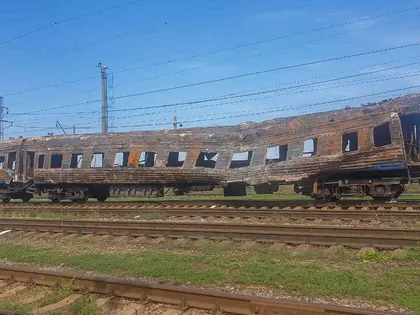In the new episode of “Rada Natsbezpeky” [State Security Council] for Islnd.tv, filmed on the eve of the New Year, Tatiana Popova interviewed the press-attaché of the U.S. Embassy in Ukraine Daniel Langenkamp.
The English version is an exclusive for Kyiv Post. The Ukrainian video version is available here.
Popova: A couple of days ago the Kremlin proposed to the White House a so-called “new world order treaty.” Moscow wants NATO and US military not only to leave non-alliance countries like Ukraine, but also Western European countries that are in NATO. We don’t know what the US response will be, but should Ukraine prepare for US and NATO military help to end soon?
Langenkamp: One of the things that we’ve always said to Ukraine is that we stand with it in its efforts to assert its sovereignty and its territorial integrity. We stand with Ukraine in its efforts to combat Russian aggression. What we’ve always said to Russia, and what President Biden just said to Russia, was that no country has the right to tell another country, including Ukraine, what its security alliances can or cannot be. No country can tell a country what its internal politics should be. No country can tell another country what its borders should be. We have asserted that and will continue to stand on the side of Ukraine in this issue.
I should also say that we are lashed up very closely with Ukraine in this whole dialogue with Russia. We’re trying to emphasize that we need to de-escalate and we need to begin a diplomatic process with Russia and with Ukraine and our NATO allies to be able to reduce tensions. And we will continue to assert that. That means discussions with Russia in the NATO-Russia Council and in other forms as well.
Nord Stream 2
Popova: After Biden’s and Putin’s negotiations, the sanctions on North Stream 2 were gone from the US military budget for next year. In Ukraine the public is concerned about those actions. How will the US back up Ukraine if and when Nord Stream is launched?
Langenkamp: I think we have first to look at the joint statement that the U.S. and Germany agreed upon a few months ago. And in that agreement, it says that if Russia uses Nord Stream 2 as a weapon, or it encourages further aggression against Ukraine, there will be specific commitments by the U.S. and Germany in regard to this. So, we have to remember also that Nord Stream 2 is not operational yet. That means it is not leverage for Russia or for Vladimir Putin. It is actually leverage for the west because if Russia wants Nord Stream 2 to operate, it can’t stage further aggression against Ukraine. In the joint statement with Germany, we have committed to mitigating the impacts of Nord Stream 2 upon Ukraine. And we will continue to work with Germany on that.
I should also underscore that the administration is currently in negotiations with our U.S. Congress on a package of sanctions that would incur or put costs on Russia if it uses Nord stream 2 as a geopolitical weapon. We have always said that Nord Stream 2 is a bad deal for Europe, a bad deal for Ukraine, and a bad deal for European security. We have opposed it, and we will continue to do so.
Popova: Right after the negotiations, Biden called Germany, France, Great Britain and even Italian colleagues, to inform them about talks with Putin. However Ukrainian president Zelensky had a call with Biden several days after. Can you explain why this kind of priority?
Langenkamp: Well, the schedules of presidents are always very difficult to arrange. But remember what happened before and after the calls with the European leaders and president Putin. Secretary Blinken spoke with President Zelensky just before the call between Biden and Putin happened. And then President Biden called the four, what we call quint leaders Germany, France, the UK and Italy to brief them on that. And then after he had all of that put together, then he called President Zelensky to help explain to him and help bring him into this discussion. So that he was fully informed. It actually makes a lot of sense. So, President Zelensky was last so that he could be given a full reading of everything that had taken place before that.
As we have always said — and this is really important — nothing about Ukraine without Ukraine. We have been keeping Ukraine informed and involved in these discussions ever since the beginning. We will continue to do that. We’re doing it all the way from the presidential level down to my level really. Basically, our communication is taking place every day so that everybody, not only Ukraine and the United States, but all of our European partners – are involved as well. I mean, we do see this situation as not involving only Ukraine. It is a situation really that affects all of Europe because another country shouldn’t be able to threaten or invade another country. It affects all of our security.
Ukraine’s choices
Popova: There’s Putin’s statement that Russia will not be able to do anything about Ukraine’s accession to NATO. And Peskov’s statement that Ukraine is lost for Russia as a partner and ally. Have we stopped being a zone of Russian influence?
Langenkamp: I can’t comment on that, but what we have always said — what Secretary Blinken has said, and what President Biden has always stated — is that we’re seeking a predictable, stable relationship with Russia. So, where there are issues where we can agree or where we can negotiate, we will do that. And where there are issues where there are things to talk about, there are concerns, we hope to do that through diplomatic dialogue. That’s why we are trying to de-escalate this current crisis through diplomacy. We will continue to do that. We did this all throughout the Cold War. We can do it now too if Russia will behave responsibly and come to the table.
What we have said, what Secretary Blinken has said is that we can’t look at formulations of the world that existed in the past, and this idea of a buffer zone concept is something really from the past. We’ve stood with Ukraine ever since it declared its intention to join Euro-Atlantic institutions like NATO and like the European Union. We’ve stood with Ukraine in its efforts to achieve those ambitions.
Those ambitions are now written in the constitution of Ukraine and as a partner and as a friend we have supported Ukraine in its efforts to determine its own path, to determine its own way forward in the future. That is why we have provided a lot of assistance for Ukraine — not only to defend its territory and its sovereignty — but also to become NATO inter-operable. You know this is Ukraine’s choice and we’re supporting that.
So, we’ve provided assistance to help Ukraine reform, work on things like justice reform or erect its anti-corruption architecture. or to do a whole range of other things like local government reform and land reform, all of which is very important for Ukraine in its future integration into the west. So that’s something that we will continue to do.
Again, it all comes back to this question: No country can tell another country what its foreign alliances can be, can tell another country what its ambitions can be, no other country can tell another country what its borders can be. And we will continue to stand by Ukraine in its ambitions to join the West, in line with its own desires. Remember, Ukraine fought two really important revolutions in the last 30 years, even since 2004, to try to achieve these ambitions. So, the people of Ukraine have spoken very clearly about what their ambitions are. And we stand with them.
You can also highlight the text and press Ctrl + Enter







Comments (0)